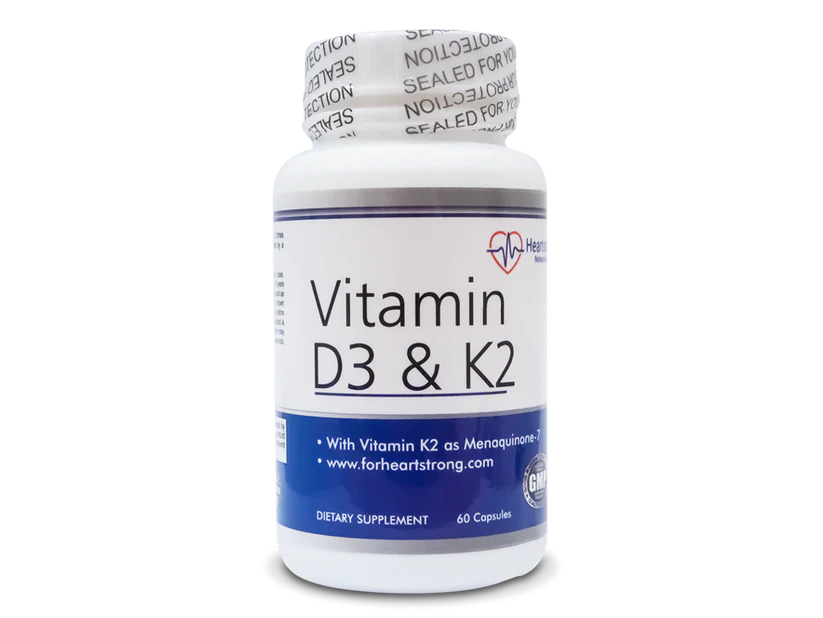In recent years, vitamins K2 and D3 have gained significant attention for their essential roles in maintaining optimal health. While most people are familiar with vitamin D, the importance of vitamin K2 is often overlooked. Both vitamins work synergistically to support various bodily functions, particularly in promoting bone and heart health. In this article, we will explore the benefits of vitamins K2 and D3, their sources, the science behind their health benefits, and why they should be part of your daily routine.

Understanding Vitamins K2 and D3
What is Vitamin K2?
Vitamin K2, a fat-soluble vitamin, is part of the vitamin K family, which includes vitamin K1 (phylloquinone) and K2 (menaquinone). Vitamin K2 is primarily found in animal products beef liver and cheese, and fermented foods. It plays a crucial role in blood clotting, bone metabolism, and cardiovascular health.
What is Vitamin D3?
Vitamin D3, also known as cholecalciferol, is a nutrient that helps your body to absorb calcium. You can get it through eating foods such as fish, eggs, and cheese or through exposure to sunlight. It´s another fat-soluble vitamin that is essential for maintaining healthy bones and supporting the immune system.
How Vitamin D3 and K2 work together?
While both vitamins are effective on their own, they work best when combined. Vitamin D3 enhances calcium absorption in the gut, while vitamin K2 directs calcium to the bones and teeth, preventing it from accumulating in the arteries and soft tissues. This synergy is vital for maintaining a healthy cardiovascular system and preventing osteoporosis.
1. Promotes Bone Health
One of the most well-known benefits of vitamins K2 and D3 is their role in bone health. Vitamin D3 helps the body absorb calcium, which is essential for maintaining strong bones. However, without sufficient vitamin K2, calcium can accumulate in the arteries instead of being deposited in bones.
Research shows that vitamin K2 activates proteins such as osteocalcin, which binds calcium to the bone matrix, enhancing bone density and reducing the risk of fractures. Studies have demonstrated that higher intakes of vitamin K2 are associated with increased bone mineral density and a lower risk of osteoporosis.
2. Supports Cardiovascular Health
Vitamins K2 and D3 are also crucial for heart health. Vitamin D3 helps regulate blood pressure and inflammation, while vitamin K2 prevents arterial calcification. When calcium is not properly directed to the bones, it can lead to the hardening of arteries, increasing the risk of cardiovascular diseases.
Several studies have found that individuals with higher levels of vitamin K2 have a lower risk of heart disease. For instance, a study published in the journal Thrombosis and Haemostasis found that those with the highest intake of K2 had a 50% lower risk of cardiovascular disease compared to those with the lowest intake.
3. Enhances Immune Function
Vitamin D3 is well-known for its role in supporting the immune system. It helps regulate the immune response, reducing the risk of infections and autoimmune diseases. A deficiency in vitamin D can lead to an increased susceptibility to infections.
Vitamin K2, though less recognized, also contributes to immune health. It has been shown to influence the activity of immune cells, enhancing the body’s ability to fight off pathogens. Together, vitamins K2 and D3 create a powerful defense against various illnesses.
4. Supports Dental Health
Both vitamins K2 and D3 are essential for dental health. Vitamin D3 aids in calcium absorption, which is vital for strong teeth. Vitamin K2 activates proteins that help bind calcium to the teeth, supporting their structure and preventing cavities.
Research indicates that a combination of vitamins K2 and D3 can lead to improved oral health. For instance, a study published in the journal Nutrition Research found that participants who took both vitamins experienced a significant reduction in dental caries.
Sources of Vitamins K2 and D3
Dietary Sources of Vitamin K2
Vitamin K2 can be found in several foods, particularly:
Fermented Foods: Natto (fermented soybeans) is one of the richest sources of vitamin K2. Other fermented foods like sauerkraut and kimchi contain varying amounts as well.
Animal Products: Foods such as egg yolks, cheese, and organ meats (like liver) are excellent sources of vitamin K2. The amount varies depending on the animal's diet and the fermentation process used.
Fatty Fish: Certain fish, like salmon and mackerel, also provide vitamin K2, along with healthy omega-3 fatty acids.
Dietary Sources of Vitamin D3
Vitamin D3 can be obtained from several sources, including:
Sunlight: The body synthesizes vitamin D3 when the skin is exposed to sunlight. Spending about 10-30 minutes in the sun several times a week can help maintain adequate levels, depending on skin type, location, and season.
Fatty Fish: Fish such as salmon, mackerel, and sardines are among the best natural sources of vitamin D3.
Fortified Foods: Many foods, including milk, orange juice, and cereals, are fortified with vitamin D3 to help people meet their daily requirements.
When to Consider Supplements
While dietary sources can help meet your vitamin K2 and D3 needs, supplementation may be necessary for some individuals, particularly those at risk for deficiencies.
Before starting any new supplement regimen, it is essential to consult with a healthcare professional to determine appropriate dosages and potential interactions with medications.

Signs of Vitamins Deficiency :
Vitamin K2 Deficiency
A deficiency in vitamin K2 can lead to:
-
Increased risk of fractures and osteoporosis.
-
Poor dental health, including tooth decay.
-
Increased arterial stiffness and cardiovascular issues.
Vitamin D3 Deficiency
Vitamin D3 deficiency may manifest as:
-
Fatigue and general weakness.
-
Bone pain and muscle weakness.
-
Increased susceptibility to infections and chronic diseases.
The importance of testing for vitamin deficiency
Vitamin deficiencies can have significant implications for overall health, affecting everything from immune function to bone integrity. Given the crucial roles that vitamins play in bodily functions, understanding the importance of testing for vitamin deficiencies is essential.
The Role of Testing
Self-diagnosing vitamin deficiencies based on symptoms can be misleading, as many symptoms overlap with other health conditions. Testing provides a clear and accurate diagnosis, allowing healthcare providers to tailor treatment plans effectively.
Monitoring Health Status
Regular testing can help monitor vitamin levels, particularly for individuals at higher risk of deficiencies, such as:
-
Elderly Individuals: As absorption decreases with age, older adults may require more frequent testing.
-
Pregnant and Nursing Women: Increased nutritional needs can lead to deficiencies.
-
Individuals with Health Conditions: Those with malabsorption issues, gastrointestinal disorders, or chronic illnesses may need regular assessments.
If you suspect that you may be deficient in either vitamin K2 or D3, consider discussing testing options with your healthcare provider. Blood tests can help determine your levels and guide appropriate supplementation.
By prioritizing vitamin testing, you empower yourself with knowledge and take proactive steps toward a healthier future. Regular assessments can lead to timely interventions, ensuring that your body receives the essential nutrients it needs to thrive. Don’t wait for symptoms to arise; take charge of your health today by considering vitamin deficiency testing as part of your routine healthcare.

Vitamins K2 and D3 are essential for maintaining optimal health through their roles in bone health, cardiovascular health, immune function, dental health, and potentially cancer prevention. Their synergistic effects highlight the importance of obtaining adequate amounts of both vitamins through diet and, when necessary, supplementation.
Incorporating foods rich in vitamins K2 and D3 into your daily diet, along with sensible sun exposure, can significantly enhance your overall well-being. As always, consult with a healthcare professional before making any significant changes to your diet or supplement routine.
If you need to know more about vitamins k2 & D3 or would like to purchase any of our supplements to improve your vitamin levels, please contact us.
Boost Your Health with HeartStrong Vitamin Blend
Support your heart, bones, and overall wellness with our HeartStrong Vitamin Blend, formulated with essential vitamins K2 and D3. Shop now to take the next step toward a healthier, stronger you!

